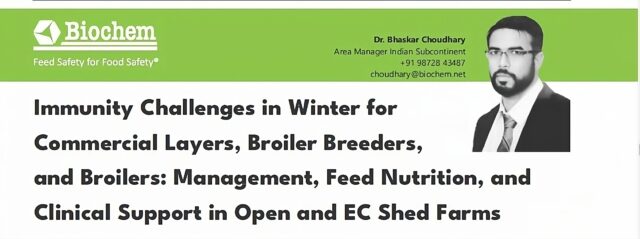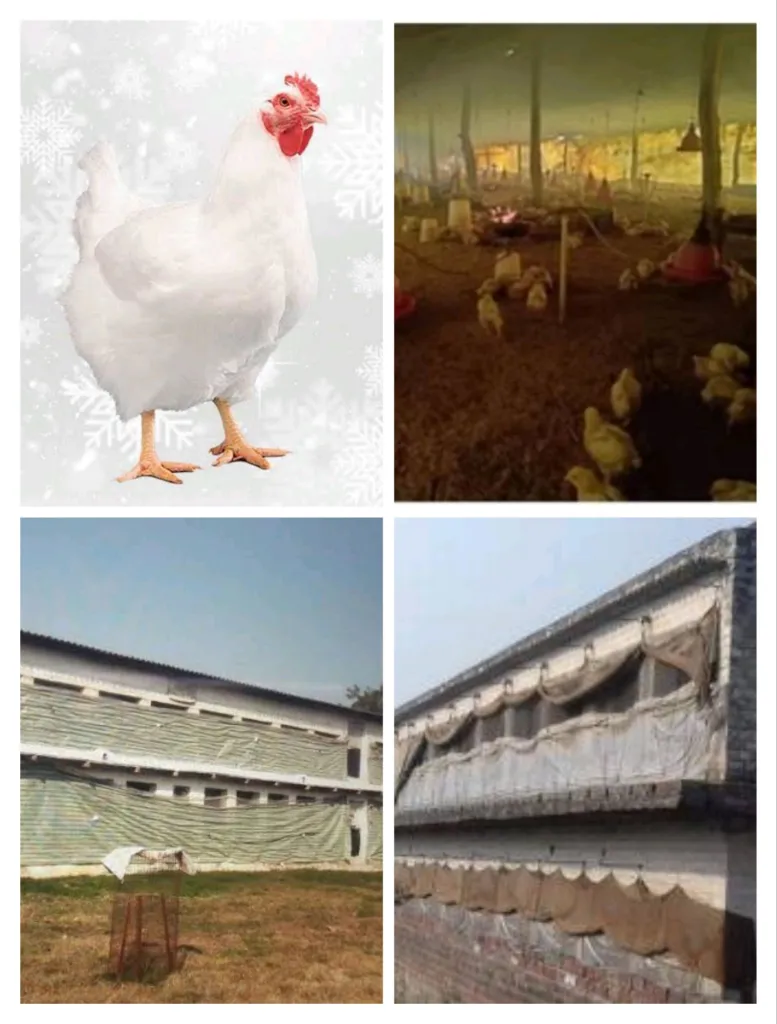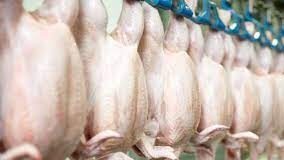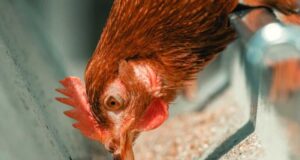
Introduction :
Winter brings several challenges to poultry health, particularly affecting the immune system. Commercial layers, broiler breeders, and broilers reared in both open shed and environment-controlled (EC) shed farms are vulnerable to temperature-induced stress, which suppresses immunity and productivity. To mitigate these effects, a combination of management strategies, feed nutrition, and clinical nutritional support is essential.

Immunity Challenges in Winter
1. Temperature Fluctuations: Birds exposed to cold stress, especially in open sheds, experience impaired immune function. The stress-induced reduction in immune response makes the birds more susceptible to infections, including respiratory diseases and enteric pathogens. Even in EC shed farms, improper temperature management can lead to similar immune challenges.
2. Bird Immunoglobulins (Ig): Immunoglobulins (Igs), primarily IgA, IgG (also known as IgY in birds), and IgM, are critical components of the poultry immune system. These proteins are produced by B lymphocytes and are essential in combating pathogens. To maintain effective immunity in poultry birds, the recommended antibody titer levels are as follows:
IgG (IgY): This immunoglobulin provides systemic immunity and helps neutralize pathogens throughout the bird’s body. In healthy broilers and layers, a minimum level of 4-6 mg/mL of IgY is typically required for robust immunity .
IgA: Critical for mucosal immunity, particularly in the gastrointestinal and respiratory tracts. The optimal IgA concentration in healthy poultry should range between 1-2 mg/mL .
IgM: This immunoglobulin is responsible for the primary immune response. IgM levels should ideally be around 0.5-1 mg/mL in poultry .
3. Respiratory and Gut Health: Cold temperatures and improper ventilation in open sheds often lead to respiratory challenges, such as Infectious Bronchitis (IB) and Chronic Respiratory Disease (CRD). These diseases impair the bird’s ability to maintain mucosal immunity, a first line of defense against airborne pathogens .
Nutritional Management
1. Amino Acids in Feed for Immunity: Amino acids are the building blocks of proteins and are crucial in supporting immune function, particularly the production of immunoglobulins (Igs). During winter, birds’ feed intake can drop due to cold stress, so ensuring an optimal balance of amino acids is vital for maintaining immunity. Each amino acid plays a specific role in the synthesis of immunoglobulins, and their presence is essential for different Ig types to function optimally:
Lysine: Lysine is essential for the production of all types of immunoglobulins, especially IgG (IgY) and IgM . Research suggests that for increasing IgG levels in birds, lysine supplementation should be between 1.0-1.2% of total feed intake to support optimal immune function.
Threonine: Threonine plays a key role in the production of secretory IgA (sIgA), which is vital for mucosal immunity. Threonine supplementation should be around 0.8-0.9% of the diet to maximize sIgA production and mucosal defense .
Methionine: Methionine is crucial for the production of IgM and also supports antioxidant production, which protects immune cells during cold stress. For optimal IgM levels, methionine should be included at 0.35-0.40% of the diet .
Arginine: Arginine is necessary for T-cell proliferation and supports immunoglobulin synthesis indirectly through improved immune cell function. Arginine should be supplemented at 1.2-1.4% of feed intake to support enhanced immune cell and immunoglobulin production .
Tryptophan: Tryptophan is essential for stress reduction, indirectly supporting immunoglobulin production. It should be supplemented at 0.2-0.25% to help reduce stress and enhance overall immunity .
2. Use of Betaine: Natural Betaine acts as an osmolyte and helps birds cope with osmotic stress caused by cold weather. Betaine supports the production of immunoglobulins, particularly IgG (IgY), enhancing systemic immunity. Studies have shown that Betaine can boost IgG levels by 10-15% in birds when supplemented at 0.1-0.2% of total feed intake . Additionally, Betaine has been observed to enhance IgA production in the gut by improving gut health and mucosal immunity, which is crucial for fighting enteric pathogens during winter.
Bacillus coagulans and Immunoglobulin Production
Bacillus coagulans, a heat-resistant and pH-stable probiotic, plays a significant role in enhancing the bird’s immune system, especially under winter stress. It supports gut health and boosts the production of critical immunoglobulins:
IgA and Mucosal Immunity: Bacillus coagulans enhances the production of secretory IgA (sIgA) in the gut, which is crucial for preventing enteric infections .
IgG (IgY) and Systemic Immunity: Bacillus coagulans increases systemic IgG (IgY) levels, providing birds with enhanced systemic immunity to fight off infections during the winter months . Supplementation of Bacillus coagulans at 1.0 x 10⁸ CFU/g in the feed is recommended for improving immunoglobulin levels and overall bird health.
Prebiotics: Bakery Yeast Moss and Its Impact on Immunity
Prebiotics, particularly Bakery Yeast Moss (Saccharomyces cerevisiae cell wall components), are increasingly used in poultry nutrition to enhance gut health and immunity. The mannan-oligosaccharides (MOS) and β-glucans present in yeast cell walls stimulate immune function and improve resistance to infections by enhancing the bird’s immune system.
MOS and Immunoglobulin Production: Mannan-oligosaccharides in Bakery Yeast Moss have been shown to increase the production of secretory IgA (sIgA) in the gastrointestinal tract, strengthening mucosal immunity. This is particularly important in winter when birds face an increased risk of enteric infections. MOS improves the overall gut microflora, reducing pathogen load and indirectly supporting immune function.
β-Glucans and Systemic Immunity: β-glucans present in yeast cell walls are known to activate macrophages and other immune cells, enhancing the bird’s ability to produce IgG (IgY) and IgM. Studies have shown that supplementing yeast-based prebiotics can boost systemic immunity by increasing antibody titers, particularly IgG, by 10-20% during stressful periods such as cold weather.
Clinical Nutritional Support
1. Electrolytes and Antioxidants: Cold stress can lead to dehydration and imbalances in electrolytes. Providing electrolyte supplements in water can help birds maintain hydration and proper electrolyte balance. Antioxidants such as selenium and vitamin C further support immune defenses against oxidative stress .
2. Probiotics : Probiotic supplements, such as Bacillus coagulans, are particularly effective in enhancing gut health and supporting immune function. Bacillus coagulans is known for its superior thermostability and pH stability, making it ideal for use in feed during winter months. By promoting a healthy gut microbiome, probiotics can enhance nutrient absorption and immune system resilience .
3. Prebiotics: Prebiotics like Bakery Yeast Moss are particularly effective in enhancing gut health and supporting immune function. By promoting a healthy gut microbiome and stimulating immunoglobulin production, improve nutrient absorption and immune system resilience.
Conclusion
Winter presents unique immunity challenges for poultry farms, particularly in open shed systems. Maintaining bird health requires a comprehensive strategy that includes environmental management, optimized feed formulations rich in essential amino acids, and clinical nutrition support. Adequate levels of key amino acids (lysine, threonine, methionine, arginine, tryptophan) and betaine can significantly boost immunoglobulin levels (IgG, IgA, IgM), enhancing overall immunity. The inclusion of Bacillus coagulans & Bakery Yeast Moss in feed further improves immunoglobulin production, ensuring the birds are better equipped to handle winter stress and infections.
References
1. Aengwanich, W., & Simaraks, S. (2004). Effect of Heat and Cold Stress on the Immune Response of Broilers. Journal of Poultry Science, 3(5), 271-274.
2. Lin, H., Decuypere, E., & Buyse, J. (2006). Oxidative Stress Induced by Cold Stress in Chickens: Biological Markers and Dietary Implications. Poultry Science, 85(2), 301-309.
3. Park, J. H., & Kang, C. W. (2013). Vitamin E Supplementation on Growth Performance and Immune Response in Cold-Stressed Broilers. Asian-Australasian Journal of Animal Sciences, 26(1), 64-70.
4. Rizk, Y. A., & Ismail, F. S. (2012). Role of Betaine in Mitigating Cold Stress in Poultry. International Journal of Animal and Veterinary Advances, 4(2), 79-86.
5. Li, P., Yin, Y. L., Li, D., Kim, S. W., & Wu, G. (2007). Amino Acids and Immune Function. British Journal of Nutrition, 98(2), 237-252.
6. Kidd, M. T. (2004). Nutritional Modulation of Immune Function in Broilers. Poultry Science, 83(4), 650-657.
7. Rajesh, S., & Savitri, P. (2008). Methionine and Immunity in Poultry: Role and Implications. Poultry Research International, 32(1), 25-35.
8. Wu, G., & Morris, S. M. (1998). Arginine Metabolism: Nitric Oxide and Beyond. Biochemical Journal, 336(Pt 1), 1-17.
9. Sandi, T., & Kold, S. (2005). Tryptophan, Serotonin and Immune Function. Journal of Nutritional Immunology, 2(1), 49-64.
For more information on Feed Nutrition &, clinical Nutrition please contact
Follow & subscribe
Follow the Animal Nutritionist (Dr Bhaskar Choudhary) channel on WhatsApp: https://whatsapp.com/channel/0029Va8bWS1IiRonR46xbE32

Best Regards
Dr Bhaskar Choudhary ( Animal Nutritionist)
















